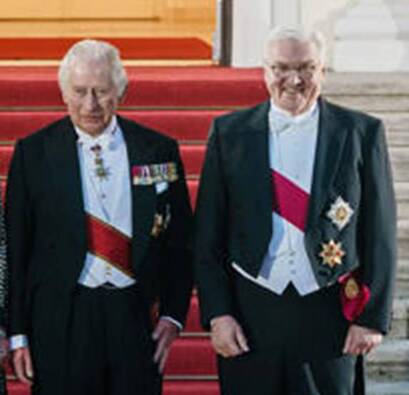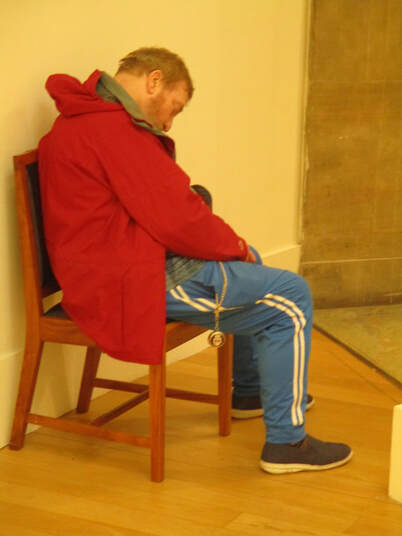- About
- Contact
- Blog
- CONSUME
- GALLERY
-
PERAMBULATIONS, Etc.
- Old Parcels Office, Scarborough
- Ghent
- White Cube
- Cornerhouse, Manchester
- Venice 2019
- Tectonics
- Leeds City Art Gallery
- Hayward Gallery, London
- Hull University Art Gallery
- Whitney Gallery, New York
- Royal Scottish Academy, Edinburgh
- Talbot Rice Gallery, Edinburgh
- Fruitmarket Gallery, Edinburgh
- Modern One & Two, Edinburgh
- Groeningemuseum, Bruges
- Humber Street Gallery, Hull
- Renwick Gallery, Washington DC
- Arenthuis, Bruges
- Ropewalk Gallery, Barton on Humber
- Geementmuseum, Den Haag
- Ferens, Hull
- Crescent Arts, Scarborough
- Walker Art Gallery, Liverpool
- Hepworth Wakefield
- Yorkshire Sculpture Park
- Stedelijk, Amsterdam
- Henry Moore Institute
- Louisiana
- SMK Copenhagen
- Yorkshire Sculpture International
- Tate Modern
- Whitworth, Manchester
|
Donald Trump is never out of the news for long, but at least now there’s a story we can celebrate—his indictment on charges related to his alleged affair with porn star Stormy Daniels. This one will run and run. But the case raises some interesting questions. First of which is could such a case occur in those countries where the judiciary has been increasingly constrained—Poland, Hungary and potentially Israel? Ironically the American system of partisan chosen judges is what all-powerful leaders want, but in the States where judges are often elected (ridiculously in my opinion) things have not quite gone entirely one way. Having said which, if a trial of Trump goes ahead he will surely appeal all the way to the Supreme Court if he’s found guilty where no doubt he will expect relief. There’s a chance he could find it too, given the apparently ’novel’ nature of the charges. And the open question is how his potential martyrdom will play out with his supporters.
Of course it could never happen here. . . Never mind threats to our Supreme Court made after it overturned Boris Johnson’s attacks on parliamentary democracy. Attacking the independence of the judicial process is commonplace—usually after a defendant’s case is lost (but Craig Murray has provided plenty of evidence where indeed this critique may be justified). If the House of Commons Standards Committee (effectively a court) finds against Johnson on the charge of deliberately misleading Parliament over ’Partygate’ there will be a loud outcry from many Tories that it was a witch hunt all along. The case of an ex-SNP MP being suspended for 30 days after breaking Covid rules will have them in jitters, but so far Tory MPs seem remarkably silent on that one. Whatever happens, we may wonder how the system can catch petty offenders (and Trump is basically a petty offender as befits a petty man) whilst crimes against humanity go unpunished or not even tested in a court of law. Think Iraq.
0 Comments
 (written with the assistance of the Daily Express) +His Majesty The King has scored a major triumph for Brexit Britain on his first state visit to Germany, where he went to see if the bomb damage had been repaired. At a state banquet Charles could be seen wearing a chestful of medals, some awarded for gallantry e.g. at Waterloo (until it was pointed out that Eurostar trains now left from St Pancras) and Gordonstoun. Other awards were made for him simply for being himself. In contrast, The German President, Frank-Walter Steinmeier, wore barely more than a cheesy grin as he realised he was outclassed and outmatched, wearing no medals at all, except for a couple of bits of tin further down his jacket. The occasion was slightly spoilt when it was noticed that neither the King nor the President had been able to get their bright red cummerbunds on correctly. Many of the King’s royal German relatives were present at the banquet, giving them the opportunity to discuss their close ties before the First World War, which they did so much to prevent. Once again, Brexit Britain has proven itself a winner without parallel in a world full of foreigners. +I may have mentioned that I’m not expecting a reply to my letter (blog 27th March) to Keir Starmer re: Jeremy Corbyn. I was talking to another Labour Party member the other day who said he’d written eight times to Starmer (not necessarily on the same subject) and had never received a reply, even though the last time he had included a stamped addressed envelope. It makes me wonder whether the leader’s office (known as LOTO—not short for a lottery but the ‘Leader Of The Opposition’s office) has yet to discover artificial intelligence. If they had, they could easily bang out emails in response to all those received, in the style of the leader. Nobody would know the difference. Interestingly (or not) I saw a bit of an interview the other day on the Nick Ferrari LBC radio programme with Starmer. He was repeatedly asked when—as in when actually—did he first approach civil servant and ‘Partygate’ investigator Sue Gray about working for him. He wriggled and squirmed and refused to answer the question, saying that everything was above board. Ferrari tried again—if it was above board why can’t you tell me when you first approached her? No answer, except that Sue Gray will answer the question herself when she has to officially report it as part of the senior civil servants’ protocols about moving on to another job. This is the same legalistic tactic Starmer used when prior to his election as party leader he refused to say where his campaign donations were coming from (all the other candidates revealed theirs) since they would be produced in line with parliamentary rules, which is to say after the election. Apart from simply being wooden, he seems intent on adding evasiveness to his persona. It’s not a good look, doesn’t inspire confidence and suggests a degree of vulnerability which will always end in shiftiness. This is, I think, self-explanatory: a letter to Keir Starmer sent today:
I have today read that you are proposing an NEC motion which has the effect of banning Jeremy Corbyn as a potential Labour parliamentary candidate. I object to this, and whilst no doubt you will never read this letter, I shall have at least put my objection on the record. I have been a Labour Party member for 39 years, during which time I have served as a councillor for twelve, a Labour Party organiser for seven and MP for nine – as well as holding a multitude of local activist positions. I feel I have as much a right to call the Labour Party my own as you do. I never actually got to know Jeremy personally when I was in parliament but one thing was clear – serial rebel though he was, both Tony Blair and Gordon Brown were big enough to tolerate his presence as a member of the PLP. It seems you are not big enough. That sends a seriously negative signal to the membership that you prefer narrow factionalism rather than a broad democratic base. This does not bode well. I think you are already treading on thin ice with your retreat from the pledges you made to members when you stood for the leadership. Do you think people, i.e. the wider electorate (not just the minority of people who join political parties) don’t notice backsliding? Leaders who purge dissent may think they’re strong, but it actually suggests weakness. It is weakness. I don’t know whether you think you’ve got the keys to No. 10 in the bag, but I would suggest it would help your chances if you spent less time telling the world that the Labour Party is merely yours, and recognise that diverse opinion is a healthy requisite in any democratic body. It’s time you stopped obsessing about Jeremy Corbyn. If you can’t drop this obsession, many people may wonder if you aren’t actually just another establishment puppet. I told myself I would keep this short. I could write much more. But that wouldn’t increase the chances of this letter to you being read, I suspect. +The meaning of life, these days, seems to rest on the notion that love triumphs (i.e Love Island, ‘Hello!’ culture, Harry and Megs, happy clappy Christianity, etc., etc.). So it is in that vein that one can only celebrate Mr Rupert Murdoch’s fifth marriage at the age of 92. He was reported as saying that he doesn’t like dating, so he marries them instead. Presumably with the pre-nups all sorted out. He is in a sense Henry the Eighth, perhaps unhappy with some of the offspring his priors have borne him (didn’t one of Rupert’s renounce dad?). I suspect Murdoch acquires new brides in the same way he acquires newspapers. If that is so it will inevitably be a demeaning experience for his brides, albeit that they retain their heads (and headlines). If they did (or do) overstep the mark, no doubt they must go the same way as the News of the World, remembered only as a sordid episode, on the same level of sordidity (I love the occasional neologism) as perhaps the once beloved Jimmy Saville (No, not Jimmy Saville. Let’s just settle on Benny Hill). Murdoch’s ex’s have kept schtum—there seems to be an omerta in operation (nowt to do with money I dare say). Meanwhile, in related news, the New York Times reports (23/3/23) that Mr Pickles, a ‘critically endangered radiated tortoise in Houston zoo’ has just fathered three baby tortoises. Mr Pickles is 90 years old. His offspring are called Dill, Gherkin and Jalapeno. There’s some fresh ideas for naming Rupert’s potential new sprogs. It’s likely that if Rupert does sire some more little Murdochs they will only ever know him by repute. Poor things.
+At the New Contemporaries show in the Royal Scottish Academy in Edinburgh I spied what looked like a life sized Ron Mueck sculpture, which could have had a working title ‘Sleeping Form.’ These talented arts graduates can do anything! It did indeed turn out to be a sleeping form, and I was disabused of my original perception when two attendants approached the Sleeping Form and gingerly prodded it. Begrudgingly the chap woke up. Clearly the New Contemporaries hadn’t moved him to a state of astonished wakefulness. The show comprises works from graduates of several Scottish art schools, many of whom have won prizes. It’s a shame Scotland doesn’t extend to Middlesbrough, as quite clearly it would have had to feature some of my own work, which earned me an MA (with distinction). Due to Covid my cohort never even got a graduate show. It hardly seems fair. I could have won a rosette, like a prize heifer in an agricultural show. No, I’m not bitter. I imagine a couple of people who today may be a little worried about a knock on the door will be George W. Bush and Tony Blair, following the International Criminal Court’s decision to issue an arrest warrant against Putin for war crimes. Ha! Only joking! What is of more interest is what will happen as Putin meets Xi Jinping in the next couple of days. China has put forward a 12-point ‘peace plan’ which it believes could form the basis of a negotiated settlement to hostilities. Russia is ambivalent about it. The West (of course) has dismissed the Chinese proposals out of hand—as they would, since all things China are now BAD, in contradistinction to the West’s stance which is only all GOOD. Perhaps if all sides could agree on the Chinese proposals, it may save a few thousand lives, until things can finally, diplomatically be thrashed out. Well, we couldn’t have that, could we? The military-industrial complex might be left out of pocket. I dare say what I have just said is tantamount to treason, so I’ll pack my overnight bag and wait for a knock on the door.
+I appear to have had a little break from blogging, partly explained by spending some time writing about AI and politics for an article in Lobster (out soon) and a trip to London. I’ll post a reference to the article when it’s up. I’m thinking it’s time to explore another subject: what has happened to Ukraine’s very own oligarchs? We don’t seem to hear much about them these days, but they were plentiful, and by many accounts just as corrupt as Russia’s breed of conniving money grubbers. Who owns Ukraine’s assets? To ask such questions is not anti-Ukraine—I’m sure plenty of Ukrainians might ask the same question. Hopefully this war will end with a similar democratic result as occurred in the UK in 1945.
+The trip to London started with a bit of a stand-off in the first class carriage (yes, I occasionally travel first class to take full advantage of my Senior Railcard discount). On his ticket checking round the Guard (or train manager if you will) found a passenger availing himself of a first class seat whilst only possessing a second class ticket. And said passenger had also availed himself generously from the drinks trolley. It has to be said the previous train had been cancelled and this one was very full, and some passengers may have been put out by the delays, etc. This chap felt he had to sit in first class because he said he couldn’t find a suitable seat in second class—being disabled he said he needed extra space. The guard didn’t accept his argument (which went round and round for twenty or so minutes). Then the passenger found another approach—telling the guard that he was Jewish, and indeed (I quote) was ‘a representative of the Jewish nation.’ The guard asked him to upgrade his ticket (for £45) but the chap replied he only had £31 in his bank account (presumably he didn't have a credit card). With whom did my sympathies lie? With the guard. I am sure he was at serious risk of being accused of anti-Semitism with a dash of disable-ism thrown in for good measure, despite his offering to find the chap a suitable seat in second class. Eventually the chap very slowly gathered his stuff and made to leave, but then he had a faint. He ended up sitting in a different first class seat whilst a doctor on board attended to him. He was met at Peterborough by an ambulance, even though he said he felt better. All I can say is, I think he was trying it on. The tale has some disturbing undertones which hardly need elucidating.  +The race to find a Labour parliamentary candidate in my constituency, Scarborough and Whitby is underway. As with selections up and down the country it is being strictly controlled, with limited room for local members to have a say, never mind put themselves forward. This even comes down to having to submit questions to a regional official prior to the hustings meeting, for vetting presumably. One will have to come up with innocuous questions. I think ‘What is your take on Keir Starmer’s leadership?’ is innocuous and neutral enough. I’ll see whether it gets through the vetting process. +One of my post-movie watching habits is proceeding to Wikipedia to see what the film was all about and whether the critics rated it. This of course is the only way one can find out if you have wasted your time. You might think you enjoyed a film, but if the critics said it was rubbish, then you should feel abashed and repent. Last night on the BBC iplayer I watched Dark Waters, the story of how a lawyer in the US, Rob Bilot, took on DuPont, the chemicals giant for releasing dangerous chemicals into the environment—and tried its best to cover-up its misdeeds. Bilot’s fight continues to this day to get compensation for the victims. The film is highly rated and a good watch. The main ingredient of the pollution was called PFOA, or C8, an indestructible chemical which now, according to the filmmakers, can be found in 99% of humans. It is has another name: Teflon. I was hazily aware that in the early days of non-stick pans there were doubts about them. By 2005 these were more than doubts—Teflon was banned in the UK in 2005, and has been banned in many other countries too. I asked Google ‘Is Teflon safe?’ Two answers topped the list: The Yes answer is provided by the company that eventually bought out Du Pont, Chemours. Their active website, following the Google link nevertheless leads to a ‘404 page not found’ dead end. The No answer link takes you to a detailed examination of the case. At least what little info is provided by Chemours bears out a major theme in the film, which is to say that Du Pont made its safety claims based on its own research merits—and with very little government regulation in the US it could get away with that. So, yet another film exposing corporate misdoings. We’ve had Erin Brokovitch (2000, about groundwater pollution), The Insider (1999—the tobacco industry), a documentary Exxon Mobil’s Climate Cover-up (2008), and no doubt many others, more generic perhaps, like The Corporation (2003). Then of course there’s a whole genre of films about the corrupt finance industry, often including the name ‘Wall Street.’ What I wonder has been the cumulative effect of all these films? Have any of them led to change? Perhaps there’s an academic study out there somewhere. I’ll ask ChatGPT. |
Archives
March 2024
|


 RSS Feed
RSS Feed